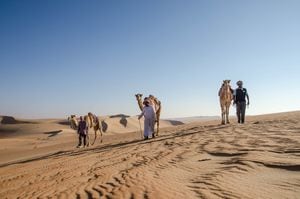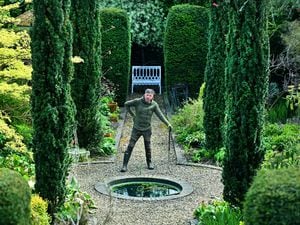Amazing tales from Shropshire's Evans of Arabia
He had been trekking through the desert for 30 days. The heat was searing, the supplies dwindling, his bone-dry clothing starch-stiff with salt and sand.

And then after days of searching, Mark Evans happened up on a water hole..
"The water was crystal-clear," he says, describing the joy and relief of finding water in the middle of the Arabian desert.
The Shropshire-born explorer, who now lives in Oman, is back in his home county to talk about his epic 800-mile crossing of the world's largest sand desert.
The former Shrewsbury schoolboy spent 49 days in the magnificent but desolate Rub' al Khali, as he made the journey from Salalah in Oman to Doha in Qatar. He was following in the footsteps of his hero Bertram Thomas, the only other man in history to have travelled that precise route.
Unlike Thomas, who crossed the desert in 1930, Mark had the internet, sat-nav and a support vehicle to assist him. But his sense of euphoria at finding a fresh water supply in the middle of the desert was probably not that different to how Thomas would have felt 89 years ago.
"It was the first time, in 30 days, we we had a proper wash," he says.
"Our clothes were like suits of armour with all the salt. We had been eating into our reserves, so it was the first time we and our camels could have a proper drink."
Mark, who grew up in Pontesbury, was joined on the expedition by two Omani natives, just as Thomas had been for his original trek. The rapid changes in temperature were something else the trio had to contend with in the Rub' al Khali, which is Arabic for the Empty Quarter.
"When the sun goes down at 6pm, it can be 26-27C (79-81F), but by 6am it can be down to minus two (28.5F), the drop is that great," he says.
Despite the inclement conditions, Mark never slept in a tent, not even in the fierce sandstorms.
"All you can do then is roll up in a blanket and wait for it to pass," he says.
"You will get buried in a shallow covering of sand, so when it's over you get up and shake it off."
Mark was at Shrewsbury's Theatre Severn this week to talk about his adventures in the desert. And he says it was his time in the county that he discovered his passion for the wilderness.
"Growing up in rural Shropshire, I was used to peace and quiet," he says. "I lived in a small community with just four houses, so I used to just get my fishing rod and make my own entertainment.
"I was quite used to my own company."
But it was a trip to the Arctic, when Mark was a 17-year-old sixth former at Priory Grammar School, across the river from the theatre, that really gave him a thirst for exploration.
"It was from there that it really took off," he says.
"I went to the North Pole and Canada, and in my mid-20s I was having a great life, without any money in the bank."
Realising that his adventures were not going to earn him a crust, he became a geography teacher 'for all the wrong reasons', but it was his passion for exploring the most solitary places that were his real driving force.
"I went into teaching for the long holidays and to earn a bit of money," he says. But it was during this time that he went on his first trip to the Middle East, and quickly became hooked on the simple way of life.
"I fell in love with it straight away," says Mark.
"It was untouched, there is that sense that you are completely out on your own.
"People think the Arctic and the desert are the complete opposite, but in many respects the people are very similar.
"I have spoken to many Bedouin and Inuit over the years, they are very friendly people.
"They both live in an environment unspoilt by human intervention, and they live the better for it."
Mark moved to Muscat in Oman in 2003, where he runs the Oman Outward Bound organisation, and has continued to travel the world to satisfy his quest for knowledge. Indeed, it is his throwaway comments, and casual asides – such as how he persuaded Prince Charles to help facilitate his expedition across the Rub' Al Khali – that belie the remarkable life he has experienced.
He says it was the lack of recognition that Thomas received for his feat in 1930 that convinced him something needed to be done to raise the profile of his achievement.
"If you ask for a book on the Rub' Al Khali', you will be given a book by Wilfred Thesiger, called Arabian Sands," he says. "But he wasn't the first."
Thesiger was an old Etonian, the son of a British consul-general, who became something of a global celebrity for his vivid descriptions of his travels. By contrast, Thomas grew up in much more modest circumstances in the village of Pill, near Bristol.
“He has been totally overshadowed by the skills and the talents and the achievements of Thesiger, in terms of being a great photographer and being a great writer, and crossing the Empty Quarter twice, to the point that he has almost been trampled over and left in the dust. And yet he was the first," says Mark.
Thomas's conquest of the Empty Quarter was something of a tactical victory over his rival Harry St John Philby, who was planning a similar expedition at the same time.
Philby, the well-connected father of the infamous traitor Kim Philby, had expressed his desire to cross the desert, and sought permission from Ibn Saud, King of Hejaz and Nejd (now Saudi Arabia) to carry out the expedition. But it was his desire to do things by the book that would prove his Achille's heel.
"When you ask permission for something, you run the risk of them saying no," says Mark. And that is precisely what the King did. At the same time Thomas, who had kept the details of his mission secret, travelled incognito, negotiating with the different tribal leaders as he made his way through the various frontiers. It too was a risky strategy. Just one uncooperative tribesman could have halted his progress, putting his life in danger, but on February 5, 1931, it was Thomas, and not Philby who declared himself the first to conquer the desert. Philby was said to have been distraught by the news, and reportedly refused to leave his room for a week.
It was around 2012-13 that Mark decided he wanted to retrace Thomas's steps, after a BBC team went to Pill to see how much locals knew about the village's remarkable son. It quickly emerged that they knew very little, and that even his gravestone had been attacked by metal thieves.
A meeting with Prince Charles during an official visit – "Oman is a very small place, and I had met him a couple of times before" – led to the Prince asking the Sultan of Oman to support his expedition.
Mark, who has been married to the 'very understanding' Madeline for 15 years, says the timing of his trip was fortunate – it was before the 2017 diplomatic crisis which saw the border with Qatar closed – and, of course it helped to have the Prince of Wales on board.
"I wouldn't be able to do it today," he says.
He set out on December 10, 2015, 85 years to the day since Thomas began his trek, and Mark is the first to admit that his crossing was nowhere near as difficult as that faced by Thomas who, having completed the expedition in 57 days, then had to take a boat to Bahrain in order to send a telegram reporting his achievement. And for all the challenges thrown up along the way, Mark feels privileged to have been able to see the sights that few others have enjoyed.
"It's incredible when the sun goes down, and the stars are all around you for 360 degrees," he says.
And the hardest part of the journey? The answer is somewhat surprising.
"I think it was when we came to the end, when we arrived in Dohar, and you know that it's over.
"There were mixed emotions of elation that we had completed it, and sadness that it was at an end.
"It was three years of my life building up to this, and now I was going back to normal life with all the pressures that entails.
"I do it because I enjoy it, not to endure it. Only fools do that."





